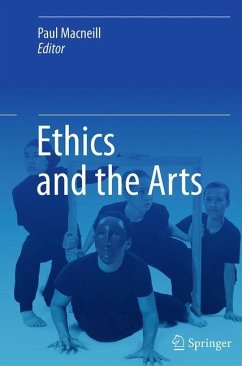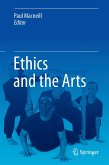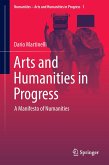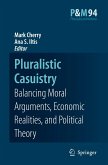Ethics and the Arts
Herausgegeben:Macneill, Paul
Ethics and the Arts
Herausgegeben:Macneill, Paul
- Broschiertes Buch
- Merkliste
- Auf die Merkliste
- Bewerten Bewerten
- Teilen
- Produkt teilen
- Produkterinnerung
- Produkterinnerung
This book proposes that the highest expression of ethics is an aesthetic. It suggests that the quintessential performance of any field of practice is an art that captures an ethic beyond any literal statement of values. This is to advocate for a shift in emphasis, away from current juridical approaches to ethics (ethical codes or regulation), toward ethics as an aesthetic practice-away from ethics as a minimal requirement, toward ethics as an aspiration. The book explores the relationship between art and ethics: a subject that has fascinated philosophers from ancient Greece to the present. It…mehr
Andere Kunden interessierten sich auch für
![Ethics and the Arts Ethics and the Arts]() Ethics and the Arts75,99 €
Ethics and the Arts75,99 €![The Contingent Nature of Life The Contingent Nature of Life]() Marcus Düwell / Christoph Rehmann-Sutter / Dietmar Mieth (eds.)The Contingent Nature of Life149,99 €
Marcus Düwell / Christoph Rehmann-Sutter / Dietmar Mieth (eds.)The Contingent Nature of Life149,99 €![Arts and Humanities in Progress Arts and Humanities in Progress]() Dario MartinelliArts and Humanities in Progress38,99 €
Dario MartinelliArts and Humanities in Progress38,99 €![Pluralistic Casuistry Pluralistic Casuistry]() Mark Cherry / Ana S. Iltis (eds.)Pluralistic Casuistry75,99 €
Mark Cherry / Ana S. Iltis (eds.)Pluralistic Casuistry75,99 €![Passionate Deliberation Passionate Deliberation]() M. F. CarrPassionate Deliberation75,99 €
M. F. CarrPassionate Deliberation75,99 €![The Practices of Human Genetics The Practices of Human Genetics]() The Practices of Human Genetics112,99 €
The Practices of Human Genetics112,99 €![Ethics Expertise Ethics Expertise]() Ethics Expertise112,99 €
Ethics Expertise112,99 €-
-
-
This book proposes that the highest expression of ethics is an aesthetic. It suggests that the quintessential performance of any field of practice is an art that captures an ethic beyond any literal statement of values. This is to advocate for a shift in emphasis, away from current juridical approaches to ethics (ethical codes or regulation), toward ethics as an aesthetic practice-away from ethics as a minimal requirement, toward ethics as an aspiration. The book explores the relationship between art and ethics: a subject that has fascinated philosophers from ancient Greece to the present. It explores this relationship in all the arts: literature, the visual arts, film, the performing arts, and music. It also examines current issues raised by 'hybrid' artists who are working at the ambiguous intersections between art, bio art and bioethics and challenging ethical limits in working with living materials. In considering these issues the book investigates the potential for art and ethics to be mutually challenged and changed in this meeting.
The book is aimed at artists and students of the arts, who may be interested in approaching ethics and the arts in a new way. It is also aimed at students and teachers of ethics and philosophy, as well as those working in bioethics and the health professions. It will have appeal to the 'general educated reader' as being current, of considerable interest, and offering a perspective on ethics that goes beyond a professional context to include questions about how one approaches ethics in one's own life and practices.
The book is aimed at artists and students of the arts, who may be interested in approaching ethics and the arts in a new way. It is also aimed at students and teachers of ethics and philosophy, as well as those working in bioethics and the health professions. It will have appeal to the 'general educated reader' as being current, of considerable interest, and offering a perspective on ethics that goes beyond a professional context to include questions about how one approaches ethics in one's own life and practices.
Produktdetails
- Produktdetails
- Verlag: Springer / Springer Netherlands
- Artikelnr. des Verlages: 978-94-017-7900-5
- Softcover reprint of the original 1st ed. 2014
- Seitenzahl: 288
- Erscheinungstermin: 27. September 2016
- Englisch
- Abmessung: 235mm x 155mm x 16mm
- Gewicht: 440g
- ISBN-13: 9789401779005
- ISBN-10: 9401779007
- Artikelnr.: 45996181
- Herstellerkennzeichnung
- Springer-Verlag GmbH
- Tiergartenstr. 17
- 69121 Heidelberg
- ProductSafety@springernature.com
- Verlag: Springer / Springer Netherlands
- Artikelnr. des Verlages: 978-94-017-7900-5
- Softcover reprint of the original 1st ed. 2014
- Seitenzahl: 288
- Erscheinungstermin: 27. September 2016
- Englisch
- Abmessung: 235mm x 155mm x 16mm
- Gewicht: 440g
- ISBN-13: 9789401779005
- ISBN-10: 9401779007
- Artikelnr.: 45996181
- Herstellerkennzeichnung
- Springer-Verlag GmbH
- Tiergartenstr. 17
- 69121 Heidelberg
- ProductSafety@springernature.com
Table of Contents
Introduction
- Art and ethics: Chapter 1
Paul Ulhas Macneill*
Part 1: What is the relation between Arts and Ethics?
- At the Crossroads of Ethics and Aesthetics: Chapter 2
Noël Carroll
Distinguished Professor, Graduate Center, City University of New York
- Nexus between aesthetics and ethics: Chapter 3
John Miles Little*
Emeritus Professor, Centre for Values, Ethics and the Law in Medicine, University of Sydney
Part 2: The Arts and Ethics
- performing arts
- theatre
- Theatre and ethics: Chapter 4
Nicholas Ridout
Reader in Theatre and Performance Studies
Department of Drama, Queen Mary University of London
Witnessing Shadows: Chapter 5
Peggy Phelan
Professor
Department of English, Stanford University
- Actor's Embodied Experience: Chapter 6
Phillip B. Zarrilli
Professor of Performance Practice
Drama Department, University of Exeter
- dance: Chapter 7
Philipa Rothfield
Brief Bio: Senior Lecturer in Philosophy at La Trobe University, Melbourne, Australia. She writes on philosophy of the body largely in relation to dance. She has engaged with the work of Merleau-Ponty, Nietzsche, Klossowski and Deleuze, to see what each of these philosophers bring to dance and also to see what dance brings to philosophy. Alongside these commitments, she has performed with Russell Dumas (director Dance Exchange, Australia), most recently in Dumas' Dance for the Time Being, (Melbourne, January and March 2010). She also reviews dance for RealTime, an Australian arts magazine.
- Aboriginal dance and performance: Chapter 8
'Listening to 'country' as ethics'
["By this is meant "the practice itself, the methodology which has been developed to create the work 'in place', 'sitting down in country' is in itself a commitment to an ethical way ofmaking art." Rachael Swain personal correspondence, 2011.]
Rachael Swain*
Director: Marrigeku Theatre Company and Stalker Theatre Company
- visual arts
- painting: Chapter 9
Jorella Andrews, 'Merleau-Ponty and the Question of Painting'
Topic from her PhD thesis: PhD in Art Theory, Essex University (1997): Merleau-Ponty and the Question of Painting
Head of Department
Department of Visual Cultures, Goldsmiths, University of London
- photography: Chapter 10
Yet to identify the appropriate person
To consult with Jorella Andrews (above) who has listed (as forthcoming) 'The Photographic Stare', Philosophy of Photography.
- film and documentary
- film: Chapter 11
Lisa Downing and Libby Saxton
Authors: Lisa Downing and Libby Saxton. 2010. Film and Ethics: Foreclosed Encounters. New York: Routledge.
Lisa Downing: Professor of French Discourses of Sexuality at the University of Exeter, UK. Director of the Centre for the Interdisciplinary Study of Sexuality and Gender in Europe (CISSGE), in the School of Arts, Languages and Literatures at Exeter.
- documentary: Chapter 12
Debora Diniz*
Brief Bio: Debora Diniz is a human rights documentary filmmaker. Her films have won more than 70 international and national awards. She is a Brazilian professor of public health and bioethics and her fields of research are reproductive and sexual rights, access to high cost medicine, psychiatric prisons, secular state and research ethics. She has agreed to write on documentaries and ethics and is an ideal person for this chapter.
Film Director, Board member of International Women's Health; One of the founders of Anis: Institute of Bioethics, Human Rights and Gender, feminist group dedicated to bioethics in Latin America.
- music
- Music and Morality: Chapter 13
Philip Alperson
Professor ofPhilosophyDirector, Center For Vietnamese Philosophy, Culture, and Society
College of the Liberal Arts, Department of Philosophy, Temple University
Chapter 14
Alex Ross
Music critic of The New Yorker since 1996
- Music as a metaphor for ethics: Chapter 15
H. Martyn Evans
Professor of Humanities in Medicine and Co-Director Centre for Medical Humanities, Durham University.
Long interest in ethics and music. Has a paper 'Medicine and music: three relations considered' in the J Med Humanities 2007 28:135-148 which considers music as a metaphor for medicine. The invitation would be to consider music as a metaphor for ethics.
- literature
Lliterature, poetry and ethics: Chapter 16
Iain Bamforth*
Part 3: Challenges to bioethics
- Bioethics in the age of new media: Chapter 17
Joanna Zylinska
- Art, ethics, science and medicine: Chapter 18
Paul Macneill and Brona Ferran*
Authors of 'Art and bioethics: shifts in understanding across genres.' Journal of Bioethical Inquiry 2011; 8(1):71-85.
Paul Ulhas Macneill
- Bio-art and ethics: an artist's perspective: Chapter 19
Ionat Zurr*
Brief Bio: An artist who, with Oron Catts, established SymbioticA: which is a laboratory at the University of Western Australia established for artists to develop projects in collaboration with biological scientists and researchers Part 4: Art and Ethics in particular contexts
- Literary metaphors in ethical advocacy: Chapter 20
George Annas*
- The medical humanities and their discontents: Chapter 21
Claire Hooker*
- Art, place, climate: Chapter 22
Ruth Little*
Conclusion
Aesthetics and ethics: a wide canvas: Chapter 23
Paul Ulhas Macneill*
See Brief bio under Introduction above.
* Chapter offered.
Introduction
- Art and ethics: Chapter 1
Paul Ulhas Macneill*
Part 1: What is the relation between Arts and Ethics?
- At the Crossroads of Ethics and Aesthetics: Chapter 2
Noël Carroll
Distinguished Professor, Graduate Center, City University of New York
- Nexus between aesthetics and ethics: Chapter 3
John Miles Little*
Emeritus Professor, Centre for Values, Ethics and the Law in Medicine, University of Sydney
Part 2: The Arts and Ethics
- performing arts
- theatre
- Theatre and ethics: Chapter 4
Nicholas Ridout
Reader in Theatre and Performance Studies
Department of Drama, Queen Mary University of London
Witnessing Shadows: Chapter 5
Peggy Phelan
Professor
Department of English, Stanford University
- Actor's Embodied Experience: Chapter 6
Phillip B. Zarrilli
Professor of Performance Practice
Drama Department, University of Exeter
- dance: Chapter 7
Philipa Rothfield
Brief Bio: Senior Lecturer in Philosophy at La Trobe University, Melbourne, Australia. She writes on philosophy of the body largely in relation to dance. She has engaged with the work of Merleau-Ponty, Nietzsche, Klossowski and Deleuze, to see what each of these philosophers bring to dance and also to see what dance brings to philosophy. Alongside these commitments, she has performed with Russell Dumas (director Dance Exchange, Australia), most recently in Dumas' Dance for the Time Being, (Melbourne, January and March 2010). She also reviews dance for RealTime, an Australian arts magazine.
- Aboriginal dance and performance: Chapter 8
'Listening to 'country' as ethics'
["By this is meant "the practice itself, the methodology which has been developed to create the work 'in place', 'sitting down in country' is in itself a commitment to an ethical way ofmaking art." Rachael Swain personal correspondence, 2011.]
Rachael Swain*
Director: Marrigeku Theatre Company and Stalker Theatre Company
- visual arts
- painting: Chapter 9
Jorella Andrews, 'Merleau-Ponty and the Question of Painting'
Topic from her PhD thesis: PhD in Art Theory, Essex University (1997): Merleau-Ponty and the Question of Painting
Head of Department
Department of Visual Cultures, Goldsmiths, University of London
- photography: Chapter 10
Yet to identify the appropriate person
To consult with Jorella Andrews (above) who has listed (as forthcoming) 'The Photographic Stare', Philosophy of Photography.
- film and documentary
- film: Chapter 11
Lisa Downing and Libby Saxton
Authors: Lisa Downing and Libby Saxton. 2010. Film and Ethics: Foreclosed Encounters. New York: Routledge.
Lisa Downing: Professor of French Discourses of Sexuality at the University of Exeter, UK. Director of the Centre for the Interdisciplinary Study of Sexuality and Gender in Europe (CISSGE), in the School of Arts, Languages and Literatures at Exeter.
- documentary: Chapter 12
Debora Diniz*
Brief Bio: Debora Diniz is a human rights documentary filmmaker. Her films have won more than 70 international and national awards. She is a Brazilian professor of public health and bioethics and her fields of research are reproductive and sexual rights, access to high cost medicine, psychiatric prisons, secular state and research ethics. She has agreed to write on documentaries and ethics and is an ideal person for this chapter.
Film Director, Board member of International Women's Health; One of the founders of Anis: Institute of Bioethics, Human Rights and Gender, feminist group dedicated to bioethics in Latin America.
- music
- Music and Morality: Chapter 13
Philip Alperson
Professor ofPhilosophyDirector, Center For Vietnamese Philosophy, Culture, and Society
College of the Liberal Arts, Department of Philosophy, Temple University
Chapter 14
Alex Ross
Music critic of The New Yorker since 1996
- Music as a metaphor for ethics: Chapter 15
H. Martyn Evans
Professor of Humanities in Medicine and Co-Director Centre for Medical Humanities, Durham University.
Long interest in ethics and music. Has a paper 'Medicine and music: three relations considered' in the J Med Humanities 2007 28:135-148 which considers music as a metaphor for medicine. The invitation would be to consider music as a metaphor for ethics.
- literature
Lliterature, poetry and ethics: Chapter 16
Iain Bamforth*
Part 3: Challenges to bioethics
- Bioethics in the age of new media: Chapter 17
Joanna Zylinska
- Art, ethics, science and medicine: Chapter 18
Paul Macneill and Brona Ferran*
Authors of 'Art and bioethics: shifts in understanding across genres.' Journal of Bioethical Inquiry 2011; 8(1):71-85.
Paul Ulhas Macneill
- Bio-art and ethics: an artist's perspective: Chapter 19
Ionat Zurr*
Brief Bio: An artist who, with Oron Catts, established SymbioticA: which is a laboratory at the University of Western Australia established for artists to develop projects in collaboration with biological scientists and researchers Part 4: Art and Ethics in particular contexts
- Literary metaphors in ethical advocacy: Chapter 20
George Annas*
- The medical humanities and their discontents: Chapter 21
Claire Hooker*
- Art, place, climate: Chapter 22
Ruth Little*
Conclusion
Aesthetics and ethics: a wide canvas: Chapter 23
Paul Ulhas Macneill*
See Brief bio under Introduction above.
* Chapter offered.
Table of Contents
Introduction
- Art and ethics: Chapter 1
Paul Ulhas Macneill*
Part 1: What is the relation between Arts and Ethics?
- At the Crossroads of Ethics and Aesthetics: Chapter 2
Noël Carroll
Distinguished Professor, Graduate Center, City University of New York
- Nexus between aesthetics and ethics: Chapter 3
John Miles Little*
Emeritus Professor, Centre for Values, Ethics and the Law in Medicine, University of Sydney
Part 2: The Arts and Ethics
- performing arts
- theatre
- Theatre and ethics: Chapter 4
Nicholas Ridout
Reader in Theatre and Performance Studies
Department of Drama, Queen Mary University of London
Witnessing Shadows: Chapter 5
Peggy Phelan
Professor
Department of English, Stanford University
- Actor's Embodied Experience: Chapter 6
Phillip B. Zarrilli
Professor of Performance Practice
Drama Department, University of Exeter
- dance: Chapter 7
Philipa Rothfield
Brief Bio: Senior Lecturer in Philosophy at La Trobe University, Melbourne, Australia. She writes on philosophy of the body largely in relation to dance. She has engaged with the work of Merleau-Ponty, Nietzsche, Klossowski and Deleuze, to see what each of these philosophers bring to dance and also to see what dance brings to philosophy. Alongside these commitments, she has performed with Russell Dumas (director Dance Exchange, Australia), most recently in Dumas' Dance for the Time Being, (Melbourne, January and March 2010). She also reviews dance for RealTime, an Australian arts magazine.
- Aboriginal dance and performance: Chapter 8
'Listening to 'country' as ethics'
["By this is meant "the practice itself, the methodology which has been developed to create the work 'in place', 'sitting down in country' is in itself a commitment to an ethical way ofmaking art." Rachael Swain personal correspondence, 2011.]
Rachael Swain*
Director: Marrigeku Theatre Company and Stalker Theatre Company
- visual arts
- painting: Chapter 9
Jorella Andrews, 'Merleau-Ponty and the Question of Painting'
Topic from her PhD thesis: PhD in Art Theory, Essex University (1997): Merleau-Ponty and the Question of Painting
Head of Department
Department of Visual Cultures, Goldsmiths, University of London
- photography: Chapter 10
Yet to identify the appropriate person
To consult with Jorella Andrews (above) who has listed (as forthcoming) 'The Photographic Stare', Philosophy of Photography.
- film and documentary
- film: Chapter 11
Lisa Downing and Libby Saxton
Authors: Lisa Downing and Libby Saxton. 2010. Film and Ethics: Foreclosed Encounters. New York: Routledge.
Lisa Downing: Professor of French Discourses of Sexuality at the University of Exeter, UK. Director of the Centre for the Interdisciplinary Study of Sexuality and Gender in Europe (CISSGE), in the School of Arts, Languages and Literatures at Exeter.
- documentary: Chapter 12
Debora Diniz*
Brief Bio: Debora Diniz is a human rights documentary filmmaker. Her films have won more than 70 international and national awards. She is a Brazilian professor of public health and bioethics and her fields of research are reproductive and sexual rights, access to high cost medicine, psychiatric prisons, secular state and research ethics. She has agreed to write on documentaries and ethics and is an ideal person for this chapter.
Film Director, Board member of International Women's Health; One of the founders of Anis: Institute of Bioethics, Human Rights and Gender, feminist group dedicated to bioethics in Latin America.
- music
- Music and Morality: Chapter 13
Philip Alperson
Professor ofPhilosophyDirector, Center For Vietnamese Philosophy, Culture, and Society
College of the Liberal Arts, Department of Philosophy, Temple University
Chapter 14
Alex Ross
Music critic of The New Yorker since 1996
- Music as a metaphor for ethics: Chapter 15
H. Martyn Evans
Professor of Humanities in Medicine and Co-Director Centre for Medical Humanities, Durham University.
Long interest in ethics and music. Has a paper 'Medicine and music: three relations considered' in the J Med Humanities 2007 28:135-148 which considers music as a metaphor for medicine. The invitation would be to consider music as a metaphor for ethics.
- literature
Lliterature, poetry and ethics: Chapter 16
Iain Bamforth*
Part 3: Challenges to bioethics
- Bioethics in the age of new media: Chapter 17
Joanna Zylinska
- Art, ethics, science and medicine: Chapter 18
Paul Macneill and Brona Ferran*
Authors of 'Art and bioethics: shifts in understanding across genres.' Journal of Bioethical Inquiry 2011; 8(1):71-85.
Paul Ulhas Macneill
- Bio-art and ethics: an artist's perspective: Chapter 19
Ionat Zurr*
Brief Bio: An artist who, with Oron Catts, established SymbioticA: which is a laboratory at the University of Western Australia established for artists to develop projects in collaboration with biological scientists and researchers Part 4: Art and Ethics in particular contexts
- Literary metaphors in ethical advocacy: Chapter 20
George Annas*
- The medical humanities and their discontents: Chapter 21
Claire Hooker*
- Art, place, climate: Chapter 22
Ruth Little*
Conclusion
Aesthetics and ethics: a wide canvas: Chapter 23
Paul Ulhas Macneill*
See Brief bio under Introduction above.
* Chapter offered.
Introduction
- Art and ethics: Chapter 1
Paul Ulhas Macneill*
Part 1: What is the relation between Arts and Ethics?
- At the Crossroads of Ethics and Aesthetics: Chapter 2
Noël Carroll
Distinguished Professor, Graduate Center, City University of New York
- Nexus between aesthetics and ethics: Chapter 3
John Miles Little*
Emeritus Professor, Centre for Values, Ethics and the Law in Medicine, University of Sydney
Part 2: The Arts and Ethics
- performing arts
- theatre
- Theatre and ethics: Chapter 4
Nicholas Ridout
Reader in Theatre and Performance Studies
Department of Drama, Queen Mary University of London
Witnessing Shadows: Chapter 5
Peggy Phelan
Professor
Department of English, Stanford University
- Actor's Embodied Experience: Chapter 6
Phillip B. Zarrilli
Professor of Performance Practice
Drama Department, University of Exeter
- dance: Chapter 7
Philipa Rothfield
Brief Bio: Senior Lecturer in Philosophy at La Trobe University, Melbourne, Australia. She writes on philosophy of the body largely in relation to dance. She has engaged with the work of Merleau-Ponty, Nietzsche, Klossowski and Deleuze, to see what each of these philosophers bring to dance and also to see what dance brings to philosophy. Alongside these commitments, she has performed with Russell Dumas (director Dance Exchange, Australia), most recently in Dumas' Dance for the Time Being, (Melbourne, January and March 2010). She also reviews dance for RealTime, an Australian arts magazine.
- Aboriginal dance and performance: Chapter 8
'Listening to 'country' as ethics'
["By this is meant "the practice itself, the methodology which has been developed to create the work 'in place', 'sitting down in country' is in itself a commitment to an ethical way ofmaking art." Rachael Swain personal correspondence, 2011.]
Rachael Swain*
Director: Marrigeku Theatre Company and Stalker Theatre Company
- visual arts
- painting: Chapter 9
Jorella Andrews, 'Merleau-Ponty and the Question of Painting'
Topic from her PhD thesis: PhD in Art Theory, Essex University (1997): Merleau-Ponty and the Question of Painting
Head of Department
Department of Visual Cultures, Goldsmiths, University of London
- photography: Chapter 10
Yet to identify the appropriate person
To consult with Jorella Andrews (above) who has listed (as forthcoming) 'The Photographic Stare', Philosophy of Photography.
- film and documentary
- film: Chapter 11
Lisa Downing and Libby Saxton
Authors: Lisa Downing and Libby Saxton. 2010. Film and Ethics: Foreclosed Encounters. New York: Routledge.
Lisa Downing: Professor of French Discourses of Sexuality at the University of Exeter, UK. Director of the Centre for the Interdisciplinary Study of Sexuality and Gender in Europe (CISSGE), in the School of Arts, Languages and Literatures at Exeter.
- documentary: Chapter 12
Debora Diniz*
Brief Bio: Debora Diniz is a human rights documentary filmmaker. Her films have won more than 70 international and national awards. She is a Brazilian professor of public health and bioethics and her fields of research are reproductive and sexual rights, access to high cost medicine, psychiatric prisons, secular state and research ethics. She has agreed to write on documentaries and ethics and is an ideal person for this chapter.
Film Director, Board member of International Women's Health; One of the founders of Anis: Institute of Bioethics, Human Rights and Gender, feminist group dedicated to bioethics in Latin America.
- music
- Music and Morality: Chapter 13
Philip Alperson
Professor ofPhilosophyDirector, Center For Vietnamese Philosophy, Culture, and Society
College of the Liberal Arts, Department of Philosophy, Temple University
Chapter 14
Alex Ross
Music critic of The New Yorker since 1996
- Music as a metaphor for ethics: Chapter 15
H. Martyn Evans
Professor of Humanities in Medicine and Co-Director Centre for Medical Humanities, Durham University.
Long interest in ethics and music. Has a paper 'Medicine and music: three relations considered' in the J Med Humanities 2007 28:135-148 which considers music as a metaphor for medicine. The invitation would be to consider music as a metaphor for ethics.
- literature
Lliterature, poetry and ethics: Chapter 16
Iain Bamforth*
Part 3: Challenges to bioethics
- Bioethics in the age of new media: Chapter 17
Joanna Zylinska
- Art, ethics, science and medicine: Chapter 18
Paul Macneill and Brona Ferran*
Authors of 'Art and bioethics: shifts in understanding across genres.' Journal of Bioethical Inquiry 2011; 8(1):71-85.
Paul Ulhas Macneill
- Bio-art and ethics: an artist's perspective: Chapter 19
Ionat Zurr*
Brief Bio: An artist who, with Oron Catts, established SymbioticA: which is a laboratory at the University of Western Australia established for artists to develop projects in collaboration with biological scientists and researchers Part 4: Art and Ethics in particular contexts
- Literary metaphors in ethical advocacy: Chapter 20
George Annas*
- The medical humanities and their discontents: Chapter 21
Claire Hooker*
- Art, place, climate: Chapter 22
Ruth Little*
Conclusion
Aesthetics and ethics: a wide canvas: Chapter 23
Paul Ulhas Macneill*
See Brief bio under Introduction above.
* Chapter offered.








